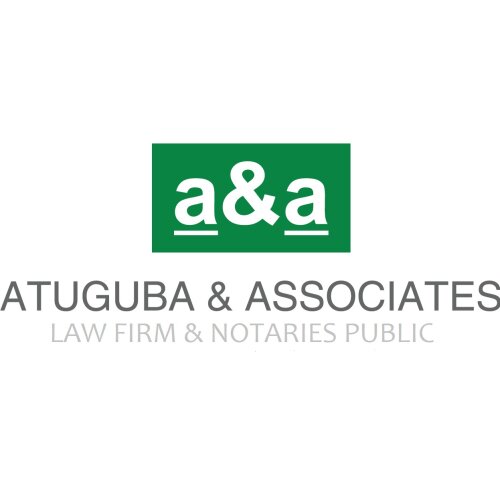Best Tax Increment Financing Lawyers in Accra
Share your needs with us, get contacted by law firms.
Free. Takes 2 min.
List of the best lawyers in Accra, Ghana
About Tax Increment Financing Law in Accra, Ghana
Tax Increment Financing (TIF) is a financial tool that local governments in Accra, Ghana, may use to encourage economic development and attract private investment to specific areas. It allows municipalities to borrow against future property tax revenues to fund infrastructure improvements, public facilities, or other projects that support economic growth. Though not commonly used in every region, TIF can play a crucial role in revitalizing underdeveloped or economically distressed areas by stimulating new investments and employment opportunities. Having a legal framework and understanding how TIF works in Accra is essential for effectively leveraging this financing method.
Why You May Need a Lawyer
Seeking legal advice in the context of Tax Increment Financing might be necessary for several reasons:
- Navigating Complex Regulations: Understanding the intricate laws and regulations governing TIF in Accra requires specialized knowledge.
- Project Proposal and Approval: A lawyer can assist in preparing and submitting project proposals to ensure compliance with legal requirements.
- Contractual Obligations: Lawyers help draft and review contracts related to TIF projects to protect clients' interests and avoid potential pitfalls.
- Dispute Resolution: If disputes arise during the implementation of TIF-funded projects, legal counsel can help resolve them amicably or through litigation.
- Taxation Issues: Understanding the tax implications of TIF projects can be complex, and a lawyer can provide guidance on tax-related matters.
Local Laws Overview
Key aspects of the legal framework for Tax Increment Financing in Accra include:
- Establishment of TIF Districts: Local authorities designate specific geographic areas as TIF districts where the increased tax revenue can be used for development.
- Eligibility Criteria: Projects must meet certain criteria to qualify for TIF, often focusing on economic impact, job creation, and community benefits.
- Approval Processes: Detailed procedures for submitting, reviewing, and approving TIF proposals are outlined, requiring adherence to government regulations.
- Financial Oversight: There are mechanisms in place to ensure transparency and accountability in the use of TIF funds, involving audits and public reporting.
Frequently Asked Questions
What is Tax Increment Financing (TIF)?
TIF is a public financing method used to support redevelopment, infrastructure, and other community projects by capturing future tax benefits resulting from the increase in property values within a designated TIF district.
How are TIF districts established in Accra?
TIF districts are established by municipal authorities based on criteria that often include economic need and potential for redevelopment. Public consultation and approvals are part of the process.
What types of projects can be funded through TIF?
Projects typically eligible for TIF funding include infrastructure improvements, commercial development, affordable housing, and public facilities that boost economic growth and public welfare.
Who benefits from TIF?
Both the public and private sectors can benefit. While private developers gain financial support for their projects, the public sector benefits from enhanced infrastructure, job creation, and an expanded tax base.
Are there any risks associated with TIF?
Yes, there are potential risks, including project failure, revenue shortfalls, or increased financial burden if anticipated tax revenues do not materialize as expected.
What role does community input play in TIF projects?
Community input is vital and typically sought through public forums and consultations to ensure that TIF projects align with local needs and priorities.
How are TIF funds repaid?
TIF funds are repaid through the increased property tax revenues generated by the new developments within the TIF district.
Can all property types benefit from TIF?
Not necessarily. The eligibility of property types for TIF benefits depends on local regulations and the specific objectives of the TIF district.
What happens if a TIF project doesn't generate expected tax revenue?
If tax revenues fall short, the municipality may need to explore alternative funding sources or adjustments to ensure the success and sustainability of the project.
How can I find out if my area is eligible for TIF?
To determine eligibility for TIF, contact your local municipal planning department or consult a lawyer specializing in Tax Increment Financing for a detailed assessment.
Additional Resources
Several resources and organizations can assist individuals seeking legal advice on TIF in Accra, including:
- Local Government Planning Departments: Offer guidance on zoning, district creation, and approval processes.
- Ministry of Finance, Ghana: Provides information on fiscal policies and financial management related to public infrastructure projects.
- Ghana Investment Promotion Centre (GIPC): Offers resources and support for investment opportunities in Ghana, including TIF.
- Legal and Financial Advisors: Professionals who can provide personalized advice and expertise in navigating TIF-specific laws and regulations.
Next Steps
If you need legal assistance with Tax Increment Financing, consider taking these steps:
- Research and Learn: Educate yourself on TIF regulations and gather as much information as possible about your specific situation.
- Consult with Experts: Reach out to lawyers and financial advisors who specialize in TIF to discuss your plans and options.
- Prepare Documentation: Assemble all necessary documents, including project proposals, financial assessments, and any pertinent correspondence with local authorities.
- Engage Legal Services: Hire a reputable lawyer to guide you through the process, ensuring that all legal requirements and best practices are adhered to.
Lawzana helps you find the best lawyers and law firms in Accra through a curated and pre-screened list of qualified legal professionals. Our platform offers rankings and detailed profiles of attorneys and law firms, allowing you to compare based on practice areas, including Tax Increment Financing, experience, and client feedback.
Each profile includes a description of the firm's areas of practice, client reviews, team members and partners, year of establishment, spoken languages, office locations, contact information, social media presence, and any published articles or resources. Most firms on our platform speak English and are experienced in both local and international legal matters.
Get a quote from top-rated law firms in Accra, Ghana — quickly, securely, and without unnecessary hassle.
Disclaimer:
The information provided on this page is for general informational purposes only and does not constitute legal advice. While we strive to ensure the accuracy and relevance of the content, legal information may change over time, and interpretations of the law can vary. You should always consult with a qualified legal professional for advice specific to your situation.
We disclaim all liability for actions taken or not taken based on the content of this page. If you believe any information is incorrect or outdated, please contact us, and we will review and update it where appropriate.

















